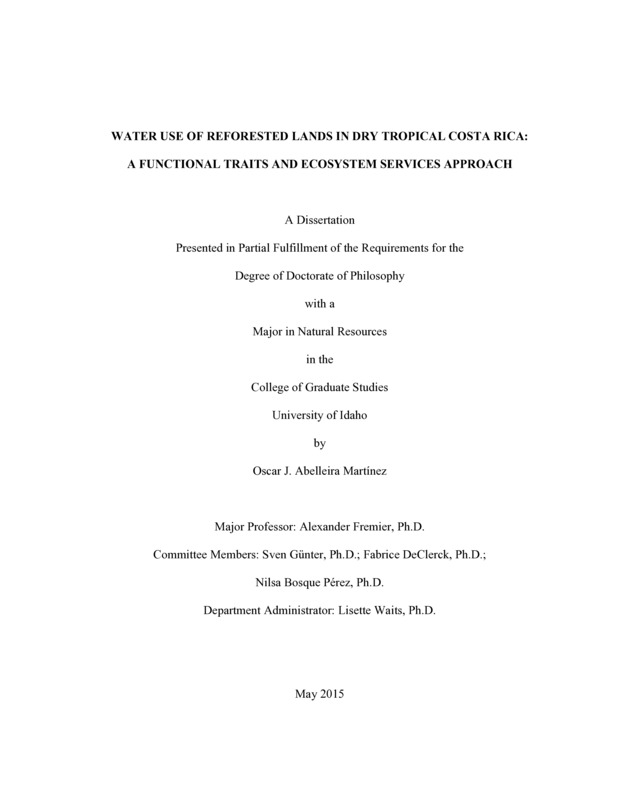Water Use of Reforested Lands in Dry Tropical Costa Rica: A Functional Traits and Ecosystem Services Approach
Abelleira, Oscar Javier. (2015). Water Use of Reforested Lands in Dry Tropical Costa Rica: A Functional Traits and Ecosystem Services Approach. Theses and Dissertations Collection, University of Idaho Library Digital Collections. https://www.lib.uidaho.edu/digital/etd/items/abelleira_idaho_0089e_10592.html
- Title:
- Water Use of Reforested Lands in Dry Tropical Costa Rica: A Functional Traits and Ecosystem Services Approach
- Author:
- Abelleira, Oscar Javier
- Date:
- 2015
- Embargo Remove Date:
- 2017-05-18
- Keywords:
- forest hydrology land cover change reforestation incentives teak plantations tropical secondary forests water scarcity
- Program:
- Natural Resources
- Subject Category:
- Ecology
- Abstract:
-
Anthropogenic land cover change causes changes in the composition and function of ecosystems, which can impact ecosystem services and affect human welfare. A functional traits approach to ecosystem services can improve our understanding of these impacts by improving the resolution of ecosystem service assessments. The first chapter of this dissertation is a review of methods for scaling variation in functional trait composition from local to regional levels. In particular, the utility of available remote sensing methods for the regional scaling of fine-resolution functional trait variation is assessed. This is illustrated with a case study that summarizes some of the research detailed in the subsequent chapters. The second chapter of this dissertation examines the water use of reforestation strategies sponsored by government monetary incentives in seasonally dry Costa Rica, a region where water scarcity impacts human welfare. By sampling tree water use and carbon gain across paired treatment sites, I found that teak plantations have similar water use but higher water use efficiency than secondary forests of similar ecological maturity. Therefore, government policies aimed at incentivizing reforestation with secondary forests is not any better at conserving water resources than those aimed at teak plantations. The third chapter in this dissertation examines what functional traits are most related to tree and forest water use and water use efficiency across secondary forests and teak plantations in seasonally dry Costa Rica. I found that water use was strongly related to biomass at the tree stand level and that a few functional traits, namely tree sapwood depth, height and crown area, were also significantly related to tree water use. However, the relationship of traits on water use efficiency was not as significant. The capacity to remotely sense traits such as tree height and crown area makes them particularly useful for the scaling of tree water use to regional levels. Although there is strong convergence of water use with biomass, there is room for the use of functional traits to improve the resolution of tree to forest water use in ecosystem service assessments.
- Description:
- doctoral, Ph.D., Natural Resources -- University of Idaho - College of Graduate Studies, 2015
- Major Professor:
- Fremier, Alexander K
- Committee:
- Gunter, Sven; DeClerck, Fabrice; Bosque Perez, Nilsa
- Defense Date:
- 2015
- Identifier:
- Abelleira_idaho_0089E_10592
- Type:
- Text
- Format Original:
- Format:
- application/pdf
- Rights:
- In Copyright - Educational Use Permitted. For more information, please contact University of Idaho Library Special Collections and Archives Department at libspec@uidaho.edu.
- Standardized Rights:
- http://rightsstatements.org/vocab/InC-EDU/1.0/

